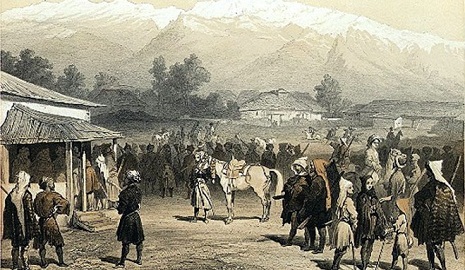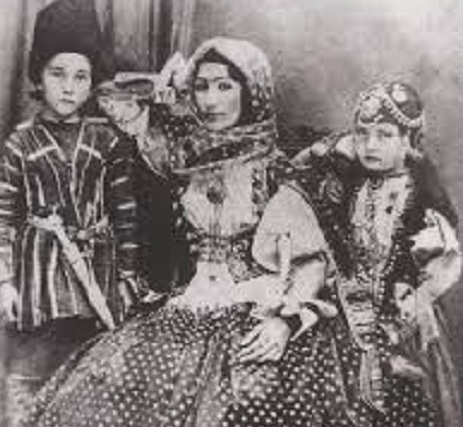
“…Khan Khasay Usmiyev.. was a 35 year old man, handsome, serious, fluent in French as a real Parisian would be. He wad dressed in a beautiful black suite, with golden threads, wearing a rather pinpointed Georgian hat. On one side he had a hanging dagger with an ivory handle in a gold-plated sheath. I must admit that I shivered when I heard such a pure and accurate French pronunciation.
When the dinner was over our carriages were ready. We were planning to take a look at the famous Baku fires. The Baku fires are well-known around the world; however, the French who travel less than others know less about them.
The famous Ateshqah temple, where the eternal fire blazes, is twenty six miles away from Baku (Dumas gives inaccurate name of Ateshgah “Artech-Gah” –ed.). This eternal fire is supported by crude oil.
…Oil comes from many parts of the earth, but in such abundance it exists only in Baku and its neighborhoods. Everywhere around the city, all along the Caspian shore there are wells dug up from three to twenty meters in depth. Through the chalky clay impregnated with oil, hundreds of these wells extract black oil, fifteen extract white oil. From these wells around 100 000 centner of oil is being extracted each year. This oil is then sent to Persia, Tiflis and Astrakhan.”
"...Zoroaster (Zaradog in pehlevi, Zaretoshtro in sind, Zerdusht in persian) is the founder or rather the reformer of the Parsee religion. He was born in Midia, or in Azerbaijan, or in Atropatena, most likely during the ruling of Gishtaps, the father of Dariq I.
“These were the people we took off to visit in their sacred place – the temple of Ateshgah.”
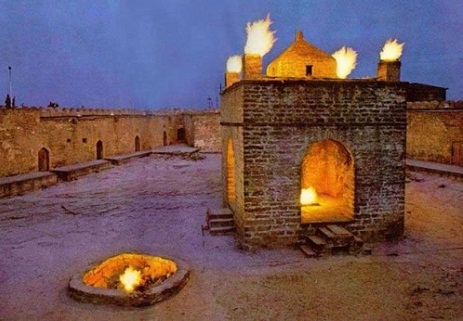
“By the end of the rite we looked around the external wells. The deepest one was around 60 feet. In former times water was drawn from it; however the water was a bit salty. At one point it disappeared. In order to find out what happened to it, a tow was thrown into it. It immediately flamed up and never faded away. One could get dizzy if bended over because of evaporation, so the danger was to fall into the well and be the fuel for the underground fire. That is why the well was surrounded with a parapet. The other wells are on the ground level, their holes are covered with a bar, and the bar is covered with stones which turn into gypsum in no later than twelve hours.
“On the eve of my departure Devim brought me his handmade shotgun choke bean and a revolver from Paris. The shotgun choke bean was already given away to Bagration, and now I had a chance to pass the revolver on to good hands. I gave it to Khasay Umsiyev. An hour later I received a note from him, written in perfect French without a single error. This is what it said:
My Lord, you own a weapon which is too perfect to allow myself to add anything to your collection; but here is a purse and two arkhaligs which the lady begs you to accept. The purse was made with her own hands.
Prince Khasay Usmiyev
Comparing the Persians, Armeniams and Azeris, Dumas described that the latter could be trusted the most (A reminder to the reader that Dumas meant Azeris when he wrote “tatars”, and the adjective “tatarski” means “azeri” – ed.)
“As to tatars we already talked about this character – the mixture with the Caucasian tribes adorned its original features”
... The Tatars make daggers with the thinnest blades, sheathes with rich decorations and same kind of rifles with instructed ivory and silver, for which a highland nobleman is ready to give away four horses and two wives. There is no need to ask for written commitment, his word is enough.”
“Baku trades silk, carpets, sugar, saffron, Persian fabric and oil…Silk trading is rather significant however it cannot compare with the Nukha one. Baku collects from five to ten thousand pounds of silk, which depending on its quality can be sold for twenty francs a pound (Russian pound equals twenty ounces).
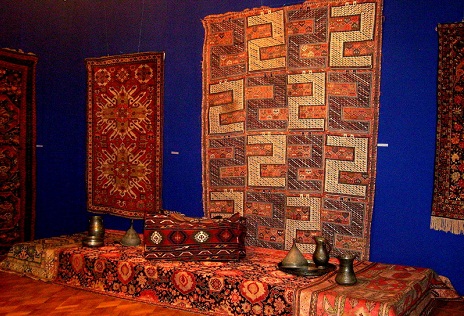
“I appeared at Mrs. Pigulevski’s place by lunch time. ”
A strong wind blew all morning and it was a stormy sea; but the wind and the sea calmed down, so Mr. Freygang hoped to show us a miraculous view which could been seen in Baku only. That was the sea fires. We were also planning to go to the Fatima mosque.” "We boarded the barge again where the roars were waiting for us and proceeded our way to cape Bail. The night was silent and very dark. In spite of this silence, a small ripple foreshadowed the coming of a storm. This ripple would only increase the picturesqueness of the view; but we had to be in a hurry, as appearing earlier than we expected the wind could deprive us of this scenery. For a second we looked for a place where we noticed the water boiling. It was rather easy to find, as we could smell the oil.
One of the sailors said to Mr. Freygang:
- It is here, captain
-Ok, do what you must- he answered, anticipating the pleasure of our surprise.
The sailor took a bunch of oakum, lit it from the lantern and threw it from the left and right sides of the barge. Immediately the sea around us ignited for an entire quarter of a mile.
Our boat looked like Kharon’s boat, travelling through the river in hell; the sea turned into a real Flegeton. We were literally sailing in the middle of the flame. Fotunately, this miraculously golden flame was transparent, just as a spirit flame and we could hardly feel its nice warmth. Freed from worries, we were able to observe this fantastic view more carefully. The sea was burning in shapes of more or less large islands; some of them were in the width of a round table for twenty people; others – the size of a Tuileries pool; we were sailing through channels, although from time to time our rowers were taking us through this burning islands. This certainly was the most breathtaking scenery, which one could see and I think nowhere but in this corner of the world it was possible..
SHEMAKHİ
“Shemakhi was the capital of Shirvan, once a rich khanate which brought its khan a lucrative income of millions. Formerly populated by one hundred thousand inhabitants, which now was ten thousand.”
“During our walk through the bazaar we were invited by a rich Shemakhi tatar Mahmud Bek to a Persian dinner and an evening with bayaders.”
Shemakhi bayaders were still famous not only in Shirvan but in all the Caucasian regions. We were told about this beautiful priestess long ago, who used to provide double services simultaneously. Do not forget to visit the bayaders in Shemakhi - Dondukov used to tell us. “Do not forget to visit the bayaders in Shemakha” Bagration used to remind. “Do not forget to see bayaders in Shemakhi” he repeated in Baku. Bayaders were left from khans’ dominion. They were court dancers.
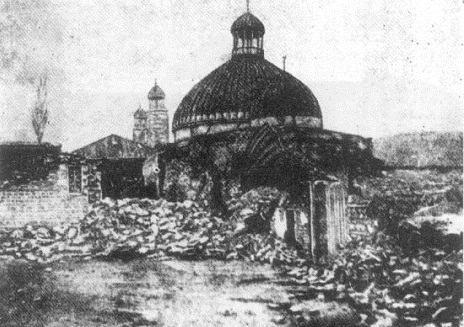
Unfortunately, just as it was the case with the Parsee, there were only three bayaders left: two women and one boy.”
“We came to Mahmud Bek. His house – one of the most amazing Persian buildings, among the ones I had seen from Derbend to Tiflis (Dumas in his novel uses the term Azerbaijani and in some places it is called Persian)”
…We entered the hall, decorated in Eastern style. Simple but rich decorations are hard to describe with a pen. All the guests were sitting on atlas pillows with golden colors, covered with tulle pillowcases that gave the brightest colors of extreme tenderness. Three dancers and five musicians were sitting at the very end, along the length of a huge window. It was clear that for such a traditional dance a very special music was required....".
"Music played. The orchestra was made of a drum on metal legs which looked like a gigantic egg cut into two; tambourine which looked like ours; flute which looked like an old tibitsina; mandolin with metal cords which goes with a stilus; and finally a chongura on a metal leg with a bolster, moving in left hand, so as the chongur would move along the cords. All of this would make a fierce noise, not very melodic, however rather original.”
“Eastern dances are the same everywhere. I have seen them in Algiers, Tunis, Tripoli and Shemakhi. More or less it is the fast foot trampling, more or less emphasized moves in the loin – a quality that I think the beautiful Nisa had brought up to perfection. (One of the bayaders at Mahmud bek’s party).”
NUKHA (SHEKI)
“At this point a handsome officer joined us. He greeted the young prince. The prince turned to me and introduced him: Mohammad-Khan. This name did not really ring a bell. I greeted him. The young officer had a cross of Saint Georges and marvelous armament.”
" -tell me, prince, who is this Mohammad Khan – I asked Ivan
-right away – he answered and turned back to Mohammad khan again; from this conversation I understood that they were talking about my armament; then he turned back to me, and Mohammad Khan followed us.
- You were talking about my armament, weren’t you my prince?
-Yes, he knows the name of the guy who made them.
He has the glory of our Kerim. You would not mind if he takes a look at them, would you?
-It would be my pleasure.
-I will now tell you about Mohammad khan: first of all he is the grandson of the last khan of Nukha. If this city and provinces did not belong to the Russians, they would belong to him. He was given a pension and a major degree. This is famous Daniel Bek’s cousin.
“Ivan turned back to me and said”
- Mohammad khan would love to have a pair of revolvers, but only Devim’s. He is wondering how he could get hold of them.
-That is very simple dear prince: Mohammad khan should just tell me what he desires and I will send them out for him.
My reply was immediately passed on to Mohammad khan. He came up to me and asked how much would two revolvers from Devim cost. I asked him not to worry about the price and assured him that he will receive the revolvers as soon as possible and send back some Caucasian ones instead. He bowed as a sign of consent, unfastened his sword and took out his pistol, stretched them out to me apologizing that he could not hand it in with his own one due to the promise given to the man who made it to forever keep it next to him. The exchange was so lucrative that I hesitated before accepting it; but Ivan told me that I would offend Mohammad khan by not accepting the gift. Then I bowed, accepting the sword and the pistol. Taste and elegance were on my mind when seeing these gifts. The sword was especially famous and from this moment until my trip to Tiflis I constantly had it on me, it attracted a lot of attention of tatar officers everywhere I met them. When a sword has this kind of a glory you can only keep guessing of the owner’s reputation.”
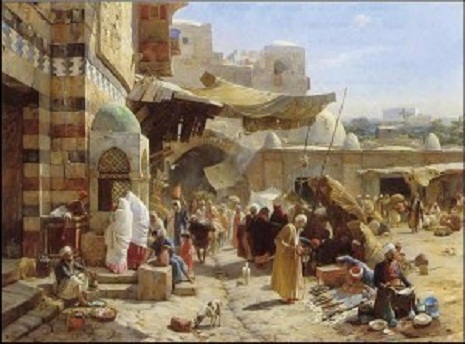
“Nukha, as we said – a wonderful town or rather a fabulous village; a resort where the population increases from April to October to sixty thousand. Everyone is looking for a shelter under a cool shadow, near the beautiful brooks.”
The main trade in Nukha – is silk. There is a filature in this village that sells six million unpainted silk. Part of the beautiful trees, casting shadows on the city buildings turned out to be mulberry leaves that serve billion of worms whose cocoons make the country rich
Muane shared Dumas’ enthusiasm: Nukha – is the most charming village which I have ever seen in my life! If we did not have to move further, we’d stay there. This is one of those places on earth where one wants to spend the rest of his life. (Muane. Journies on the shore of the Caspian and Black seas. From Baku and Tiflis. 310-317).
It is a known fact that at their first meeting with Azeri poet Natavan, Dumas played chess with her and the victory was Natavan’s. To express his admiration of her intelligence, beauty and talent of this extraordinary woman Dumas presented her with graceful mother of pearl chess, which he had brought from Paris, plus Napoleon’s small bust.
The book itself says that during his ten day visit to Azerbaijan he found time to see the most popular places, get to know the traditions of Azeri people and get acquainted with the brightest representatives of Azeri political and cultural elite. Everywhere in Azerbaijan, just as everywhere in the Caucasus, he was greeted hospitably. It should be noted that without any skills of the local language, Dumas did not have practically any chance to talk to Azeris directly and was mainly using the information collected from Russian Emperor Authority. But we should pay tribute to the courageous writer, who used his sharp wit, goodwill, observant and open mind instead of the language skills. By travelling to Azerbaijan and representing it in the old world, Dumas, probably without even realizing it, became one of the friends and first goodwill ambassador of Azerbaijan in Europe.








